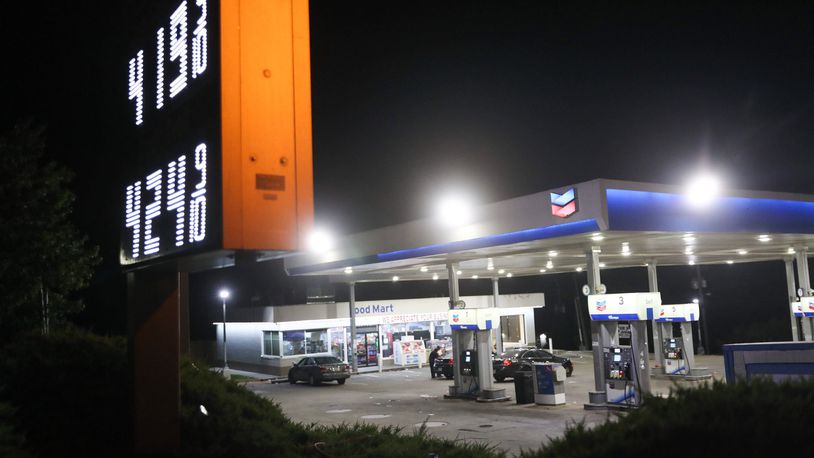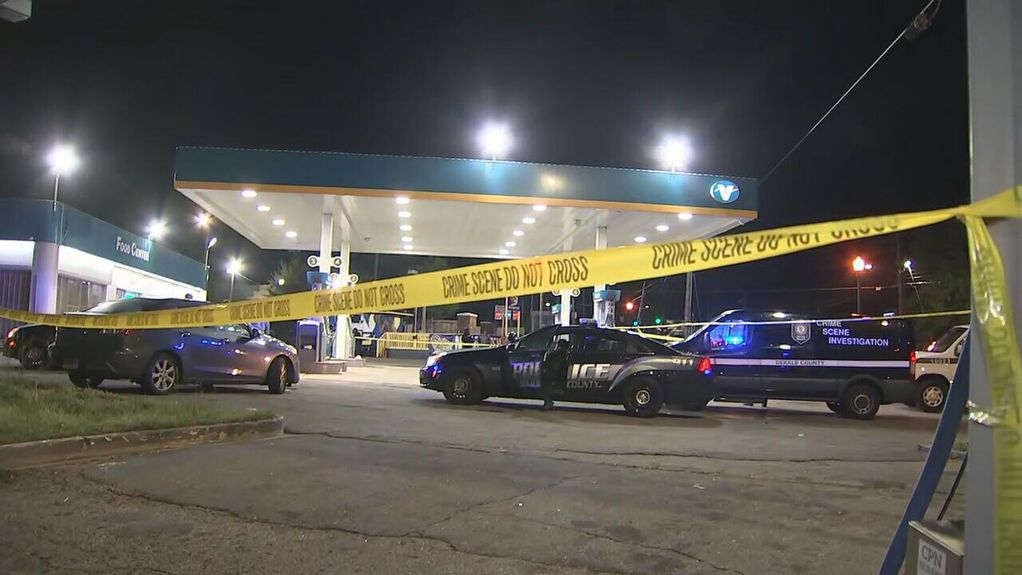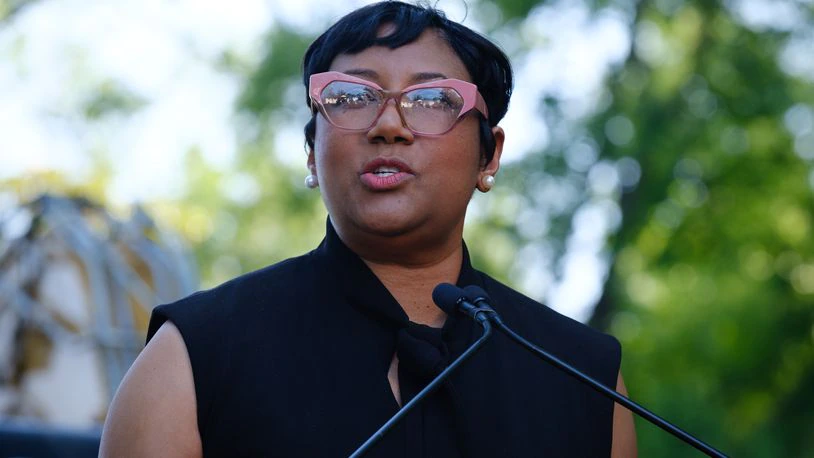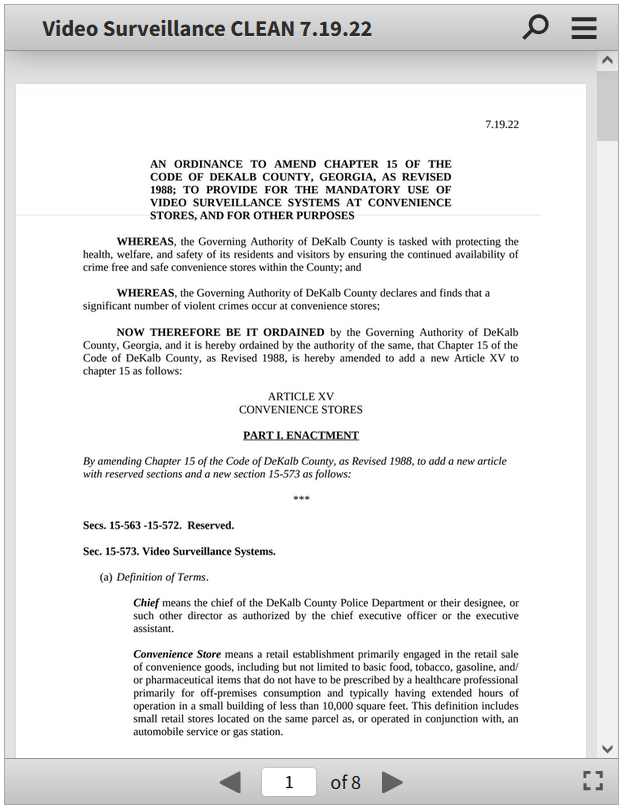
DeKalb County police are working to identify a suspect in a Wednesday morning shooting at a Chevron station on Candler Road. One man was killed, and a woman may still be in danger, Channel 2 Action News reported.
By Tyler Estep
Ordinance aimed at reducing shootings, other violent crime
Of the 50 DeKalb County locations where violent crime was reported most frequently last year, 19 were convenience stores with and without gas pumps. And nearly half a dozen homicides have occurred at similar locations so far in 2022.
This year’s incidents include several high profile shootings: a bystander killed while trying to stop a man from beating a woman at a Chevron off Candler Road; a 44-year-old killed as his passenger argued with another man at a Chevron on Columbia Drive; a young father hit by a 14-year-old’s stray bullet as he left a Covington Highway Shell station with his family.
And on and on and on.
“God almighty, we’ve got to do something,” DeKalb Commissioner Lorraine Cochran-Johnson said.
The violence is not especially unique to DeKalb County or its stores. But a proposed solution to it might be — at least in its sheer scope, which would also have implications for businesses beyond convenience stores.
Cochran-Johnson, whose commission super district covers the eastern half of the county, has for nearly two years worked on a piece of legislation that would mandate every convenience store in unincorporated DeKalb — all 236 of them — have a working video surveillance systems.
It would require the same of other businesses under certain criteria, such as if a business has more than three calls for police service in a span of 30 days, or has experienced any crimes included on a list that ranges from homicide and rape to drug dealing.
There are thorough requirements laid out for lighting, picture quality and storage, in case police need to take a look. And the mandate calls for not just a camera or two, but one covering each gas pump, entry and exit points, and each cash register.
Cameras would also be required to cover parking lots and loading docks, and would all need to be operational 24 hours a day, 7 days a week with infrared or night vision capabilities.
The measure, which will come up for a vote soon, requires initial inspections and subsequent compliance checks by code enforcement employees or police officers to make sure stores are meeting the new requirements. If they aren’t, potential penalties include citations and fines.
Lance Hammonds is president of the DeKalb NAACP and leader of the Rockbridge Coalition, a community group that earlier this year lead a rally against crime at convenience stores. He called Cochran-Johnson’s proposed ordinance past due and much-needed, especially given ongoing staffing issues at the DeKalb County Police Department.
“It puts some responsibility and onus back on the business owners to provide a safe environment for their customers,” Hammonds said.
Cameras would be mandated at DeKalb convenience stores
A proposal would require a system of high-definition cameras at more than 235 stories across the county.
Map: Charles Minshew/The Atlanta Journal-Constitution Source: DeKalb County (click the map and scroll down to the interactive map)
Under the ordinance, it would indeed be up to business owners to foot the bill for any needed surveillance additions or upgrades. Cochran-Johnson estimated that it could run the average store between $3,000 and $5,000 dollars if they’re starting from scratch.
The commissioner said the proprietors she’d spoken to were on board with her efforts — and Angela Holland, president of the Georgia Association of Convenience Stores, didn’t refute that assertion.
Holland said her advocacy and lobbying group is aware of DeKalb’s proposed ordinance and has not attempted to fight it. She called it “good business” to protect customers and employees.
“It’s already something we’re doing,” Holland said. “That’s why you turn on the news and you see the footage [of a crime]. It came from the convenience store.”
That may be true in many cases. But DeKalb police Chief Mirtha Ramos, who supports the county initiative, said the quality isn’t always there.
“Sometimes we actually get really good footage,” Ramos said. “But more often than not it’s grainy, you can’t make out the faces no matter what you do.”
 Gas station worker shot, killed during customer dispute in DeKalb County, police say
Gas station worker shot, killed during customer dispute in DeKalb County, police say
Other businesses covered by ordinance
Cochran-Johnson’s first drafted her ordinance in 2020 and resurfaced it this past February.
It’s been well-lawyered since and seems to have initial support from commissioners on the public safety committee, which is likely to vote on the measure in coming weeks. The full commission would then have to approve it as well.
There’s a lot to consider.
While all convenience stores would have to comply with the new surveillance requirements, there’s also the clause that could affect just about any other business in the county.
As written, any “retail establishment” that meets the criteria would be eligible to be designated a “monitored business” — and then be subjected to similar surveillance requirements as convenience stores.
About a dozen offenses are listed as qualifiers, including human trafficking.
Cochran-Johnson said the latter was included specifically to target local extended stay motels which, not unrelatedly, are home to some of the county’s most vulnerable residents and also magnets for crime.
DeKalb police statistics listed 12 motels that had at least five incidents of violent crime in 2021.
The only business with more reported incidents was convenience stores. While apartment complexes also had more reported crime, it remains unclear if they are covered by the ordinance.
Mandating cameras at multifamily developments would be a thornier issue, and public safety committee chairman Ted Terry said this week that county attorneys want them addressed in separate legislation.
Cochran-Johnson confirmed that such legislation is being worked.
Lester Tate, a longtime Georgia attorney and former president of the state bar, said governments likely can require private businesses to install security systems — but how, when and where such an ordinance is applied is important.
“I think as a concept it’s probably not objectionable,” Tate said. “But I think once you get into the details of it, it’s like slaying the hydra because every head you cut off there are two that grow back that create other problems.”
Privacy vs. deterrence
All of this, of course, also raises some questions about privacy — and whether cameras even work to deter crime.
Chief Ramos said more cameras would absolutely help her department solve more crimes but deterrence would probably be a slower burn, as prosecutions become publicized and repeat offenders get taken off the streets.
There don’t appear to be any other ordinances in metro Atlanta that would provide data relevant to DeKalb’s pending legislation.
Cobb County adopted a similar ordinance in 2003, though it’s nowhere near as thorough; it merely requires that convenience and package stores have “an operating and functioning video camera and recording device” at the point of sale.
A 2017 Fulton County law — which applies only to the two or so square miles of unincorporated county land — requires gas stations where violent crimes have been reported to install lighting and “an exterior security camera system” in order to avoid losing their liquor license.
In Atlanta, City Councilwoman Natalyn Archibong championed just last year an ordinance to require cameras at gas pumps. But it died in committee.
Explore Gwinnett, a branch of that suburban county’s convention and visitors bureau, did recently announce plans to provide local motels with Flock Safety cameras, which officials said read license plates and provide authorities “with critical information to investigate and solve crimes.” The county, though, doesn’t have anything on the books mandating convenience stores have video surveillance.
The academic research on surveillance cameras and crime, meanwhile, is a bit of a mixed bag.

DeKalb County Commissioner Lorraine Cochran-Johnson speaks at a press conference in Decatur announcing a $284 million water infrastructure finance and innovation act loan to DeKalb County on Thursday, May 19, 2022. (Arvin Temkar / [email protected])
Some studies have suggested no significant impact on crime rates at all; others have pointed toward declines in property crime but not violence; still others suggest that, to be most effective, cameras should be combined with other security and prevention efforts.
Read Hayes, a research scientist and criminologist at the University of Florida, said nothing is a silver bullet for preventing crime. Surveillance cameras can make a difference, he said, but should be viewed like an antibiotic or a blood pressure medicine.
They can be effective, but aren’t going to work for everybody. And the dosage, duration and other pre-existing conditions all matter.
In order to have maximum impact, Hayes said, cameras should be mounted conspicuously and not concealed in, say, a plastic dome. Signs don’t hurt. And, one way or another, the possibility of being prosecuted should be driven home.
Cochran-Johnson, whose own son was robbed at gunpoint at a local store a few years back, said she wants to complement the ordinance with a significant public campaign.
“We need to make it known that if you commit a crime in DeKalb, we are watching you,” she said.
Read the original story on AJC.com.













